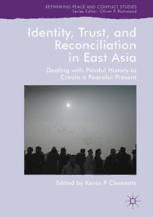
Identity, Trust, and Reconciliation in East Asia: Dealing with Painful History to Create a Peaceful Present PDF
Preview Identity, Trust, and Reconciliation in East Asia: Dealing with Painful History to Create a Peaceful Present
fl Rethinking Peace and Con ict Studies Series Editor Oliver P. Richmond University of Manchester Manchester, United Kingdom This agenda-setting series of research monographs, now more than a decade old, provides an interdisciplinary forum aimed at advancing inno- vative new agendas for approaches to, and understandings of, peace and conflict studies and International Relations. Many of the critical volumes the series has so far hosted have contributed to new avenues of analysis directly or indirectly related to the search for positive, emancipatory, and hybrid forms of peace. New perspectives on peacemaking in practice and in theory, their implications for the international peace architecture, and different conflict-affected regions around the world, remain crucial. This series’ contributions offers both theoretical and empirical insights into many of the world’s most intractable conflicts and any subsequent attempts to build a new and more sustainable peace, responsive to the needsandnorms of thosewhoareits subjects. More information aboutthisseries at http://www.springer.com/series/14500 KevinPClements Editor Identity, Trust, and Reconciliation in East Asia Dealing with Painful History to Create a Peaceful Present Editor KevinPClements NationalCentreforPeaceandConflictStudies UniversityofOtago Dunedin,Otago,NewZealand RethinkingPeaceandConflictStudies ISBN978-3-319-54896-8 ISBN978-3-319-54897-5(eBook) https://doi.org/10.1007/978-3-319-54897-5 LibraryofCongressControlNumber:2017951029 ©TheEditor(s)(ifapplicable)andTheAuthor(s)2018 This work is subject to copyright. All rights are solely and exclusively licensed by the Publisher,whetherthewholeorpartofthematerialisconcerned,specificallytherightsof translation, reprinting, reuse of illustrations, recitation, broadcasting, reproduction on microfilms or in any other physical way, and transmission or information storage and retrieval,electronicadaptation,computersoftware,orbysimilarordissimilarmethodology nowknownorhereafterdeveloped. Theuseofgeneraldescriptivenames,registerednames,trademarks,servicemarks,etc.inthis publicationdoesnotimply,evenintheabsenceofaspecificstatement,thatsuchnamesare exemptfromtherelevantprotectivelawsandregulationsandthereforefreeforgeneraluse. Thepublisher,theauthorsandtheeditorsaresafetoassumethattheadviceandinformation in this book are believed to be true and accurate at the date of publication. Neither the publishernortheauthorsortheeditorsgiveawarranty,expressorimplied,withrespectto thematerialcontainedhereinorforanyerrorsoromissionsthatmayhavebeenmade.The publisherremainsneutralwithregardtojurisdictionalclaimsinpublishedmapsandinstitu- tionalaffiliations. Coverillustration:REUTERS/AlamyStockPhoto ThisPalgraveMacmillanimprintispublishedbySpringerNature TheregisteredcompanyisSpringerInternationalPublishingAG Theregisteredcompanyaddressis:Gewerbestrasse11,6330Cham,Switzerland “This book could not be more timely or more important. With China’s rise and the waningofUSinfluenceinEastAsia,itiscrucialtounderstandthehistoricandcurrent relationships in the region in order to prevent any escalation of conflict. This book makesavailabletheviewsoflocalactorswhohavethoughtdeeplyabouttheseissuesin new ways, leading to ideas for problem-solving and trust building that are sorely needed. A must-read for the IR field, especially those focusing on conflict resolution andpeacebuilding.” —EileenF.Babbitt,ProfessorofPractice,andDirector,InstituteforHumanSecurity, TheFletcherSchoolofLawandDiplomacy,TuftsUniversity “This important book examines the recent rise of disturbing nationalism in China, SouthKorea,andJapan,afteraperiodoffocusingoneconomicwell-beingandpeaceful integration.Theperceptiveanalysesbythebook’scontributorshelpaccountforthese changes by the complex interplay of identity concerns within and among these three countries. Very usefully, the contributors also discuss ways to help overcome the deterioratingrelationsamongthesecountries.” —LouisKriesberg,MaxwellProfessorEmeritusofSocialConflictStudies,Founding Director,ProgramontheAnalysisandResolutionofConflicts,SyracureUniversity “North East Asia has become a vital region in world politics. Issues of identity and historicalmemoryplayacentralroleinitsinternationalaffairs.Thisoutstandingbook offersfirst-rateanalysesoftheseissuesandproposespositiveandpracticalstepsforward. Everyoneconcernedwithworldpoliticsshouldreadit.” —HughMiall,EmeritusProfessorofInternationalRelations,UniversityofKent “Thisisamasterlyeditedcollection,eachchapteriswellintegratedintothebigthemes that underpin the overall narrative. Thequestions it poses for the reader are challen- ging,butalsoinspiring.–Theexplanationofthewaysinwhichidentityandmemoryare fundamentaltotrustbuildingandreconciliationiscompelling.Itshouldbereadbyall scholarsandstudentsofpeacebuildingandwecandaretohopethatitisalsoread,and itslessonslearned,bysomepolicymakerstoo.” —FeargalCochrane,ProfessorofPoliticsandDirector,CentrefortheAnalysisand ResolutionofConflictattheUniversityofKent “Kevin P Clements has expertly edited a fascinating series of commentaries on the intensifyingtensionschallengingEastAsia,andhowthesemightbeaddressedforthe mutual benefit of China, Japan, and Korea. The whole undertaking, deepened by workshopinteractions,warnsofthedangersposedifnewnationalismsarenotsensitive totheregionalinterplayofhistoricalmemoriesandculturaldifferences.” —RichardFalk,ProfessorEmeritus,InternationalLaw,PrincetonUniversity,and ProfessorofGlobalStudiesattheUniversityofCalifornia,SantaBarbara. With a rising China, an anxious Japan, and an ambivalent South Korea, this excellent editedvolumebyClementsetal.opensupatimelydialogueonthehistoricalgrievances thathaveunderpinnedcontemporarypoliticsinEastAsia.Collectively,theauthorsmakea strongcasethatcurrentissuesofregionalsecurityandeconomiccooperationcannotbe addressed without first confronting the injustices of the past. To stimulate this much- neededconversation,ClementshasbroughttogetherastellargroupofKorean,Japanese, Chinese,andWesternscholarstograpplewithdeep-seatedfeelingsofmistrust,humilia- tion,domination,apology,andtraumathathavebeenexperiencedoverthepastcentury. Theimportanceanduniquenessofthisvolume'strilateralapproachcannotbeoverstated — the authors engage directly with national fears and stereotypes, acknowledging the angerandemotionthatfuelcontinuedconflict.AsaChinese-Canadianscholarwhohas livedandworkedinJapan,Ifoundtheargumentstoberefreshingandeven-handed.In takingonsuchsensitivesubjects,itmakesforuncomfortablereadingattimes,butthe authors should be applauded for pulling no punches. At the same time, it is a highly empatheticbookthatexposesthehopesandconcernsoftheJapanese,theChinese,and theSouthKoreans.Thisisavolumethatshouldbereadbyscholars,students,andpolicy makersseekingtounderstandEastAsianpolitics. —ChristineCheng,Ph.D.,Lecturer,WarStudies,King’sCollegeLondon Aninsightfulcollectionofworksthatilluminatetheproblemsofreconciliationamonga triadofcrucialAsia-Pacificcountries-Japan,ChinaandtheKoreas-strugglingwith memoriesoftheSecondWorldWar. —ChristoperMitchell,ProfessorEmeritus,SchoolforConflictAnalysisandResolution, GeorgeMasonUniversity Thisbookrefusestotakethe“conflictsofinterest”betweenChina,Japan,andKoreaas agiven.Itrecognisesthattheseseemintractablebecauseeachnationprotectsitsself- imagebycastingthe“blame”oftheirunhappyhistoryonothers–andusesthislensto assesseverycurrenttrendaspositiveornegative.” —JamesR.Flynn–ProfessorofPoliticsandPsychology,UniversityofOtago. “Whenceasefiressilencetheguns,nationsmustbeginthelaborioustasksofregional socialreconstruction:healingfromtrauma,amendingenemyimages,buildingtrusting relationships,cultivatingtransnationalidentities,anddevelopingcooperativeeconomic and security objectives. This exceptional volume explores the obstacles and processes forcreatinganenduringpeacebetweenJapan,China,andKorea,withtheirentwined historiesofenmity,competition,andconflict.Thebookoffersvitalperspectivesfrom writersrepresentingallthreenationsaswellasthevoicesofoutsideexpertsinthefield of peace and conflict. Lessons learned in East Asia instruct all of us concerned with keepingthepeaceandpreventingfuturecyclesofviolence.” —PaulaGreen,ProfessorEmeritaSchoolforInternationalTraining;Co-editor PsychologyandSocialResponsibility:FacingGlobalChallenges A CKNOWLEDGEMENTS Theproductionofabookisalwaysateameffort.Iwouldliketothankthe Toda Peace Institute for providing the financial and logistic support, which enabled me to bring together most of the authors in this book for three problem-solvingworkshops held in Bangkok, Seoul andYokohama between 2013 and 2015. I particularly want to thank Hiroshi Morita, ChloeHeinemi,SatokoTakahashi,RiaShibata,ChaiwatSathaAnandand Chung-in Moon for their help in organising the workshops and the reports thatflowed fromeachone. The National Centrefor Peace and Conflict Studies at the University of Otago gave me the time to both facilitate these workshops and edit this Volume. I want to give special thanks to my Research Assistant Ria Shibata and Dr. Ann Hassan for their assistance in preparing the final manuscript. All of the workshop participants and authors in this volume deserve special praise for theirwillingness to give theirprecious time, intelligence and expertise to explore the deeper sources of conflict in Northeast Asia andfortheirenthusiasminsuggestinghowthesenegativedynamicsmight be addressedcreatively andnon-violently. Iwouldliketothankmywife,ValerieClements,forsomeearlyeditorial workonindividualpapersandforherunswervingsupportovertheyears. I also want to thank her and my wider family for enduring my frequent absences asthisbookhas evolved over thepast year. Finally, the editorial team at Palgrave have been very helpful at all stages of the production process and I would like to give them thanks as well. ix x ACKNOWLEDGEMENTS Ihopethatthisbookwillenableitsreaderstounderstandsomeofthe ways in which emotions, identities and shared history can combine to generate negative and conflictual dynamics and why addressing these factors is so important to ensuring the conditions necessary for peaceful co-existence and more optimally deep co-operation and reconciliation between former adversaries.
